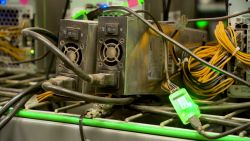Plastic products made with polyurethane, a synthetic chemical compound, typically end up buried in a landfill.
Now scientists discovered a strain of bacteria, the first of its kind, that can degrade the harmful compounds in polyurethane products – a positive step toward reducing the amount of plastic pollution in the environment.
The findings were published last week in the journal Frontiers in Microbiology.
A group of German researchers identified the bacterium Pseudomonas putida in the soil of a site covered in plastic waste. It fed on polyurethane diol, which is usually applied to materials to protect them from corrosion.
“The bacteria can use these compounds as a sole source of carbon, nitrogen and energy,” said Hermann Heipieper, study author and senior scientist at the Helmholtz Center for Environmental Research in Leipzig, in a statement to the journal. “This finding represents an important step in being able to reuse hard-to-recycle (polyurethane) products.”
Polyurethane can pollute the environment
Polyurethane foam is widely used in building materials, mattresses, car parts, spandex clothing and shoes, among others.
It’s ubiquitous, but it’s very flammable, so it’s covered in potentially carcinogenic flame retardants that can disrupt the endocrine system, said Rolf Halden, a health engineering professor and director of Arizona State University’s Biodesign Center for Environmental Health Engineering. He was not involved with the study.
Polyurethane is a polymer, a large molecule that consists of multiple smaller molecules called monomers. Its complex structure is part of what plastics so difficult to break down – and so prevalent in landfills.
It’s a long-term environmental pollutant that serves as a “raft that shuttles other pollutant in our water, food and bodies,” Halden said.
And because microbes don’t care for it, it accumulates as plastic pollution in the environment and in the food chain, Halden said.
“Big plastics cannot enter into or be absorbed into tiny fmicroorganism, so bacteria typically do not degrade polyurethane, even if they are capable of metabolizing little bits and pieces of it,” he said.
A small but crucial step toward biodegradable trash
So what do these findings mean for the tons of plastic waste sitting in landfills?
“It’s always good news if we find ways of destroying plastics, and this bacterium is no exception,” Halden said.
But its impact on plastic pollution is likely minimal, at least for now. The bacterium can metabolize the “building blocks” of polyurethane, but it alone likely could not break down large polyurethane polymers.
The researchers said more research is needed before pursuing commercial biodegradation procedures, but it’s an important step toward tackling plastic pollution.
























